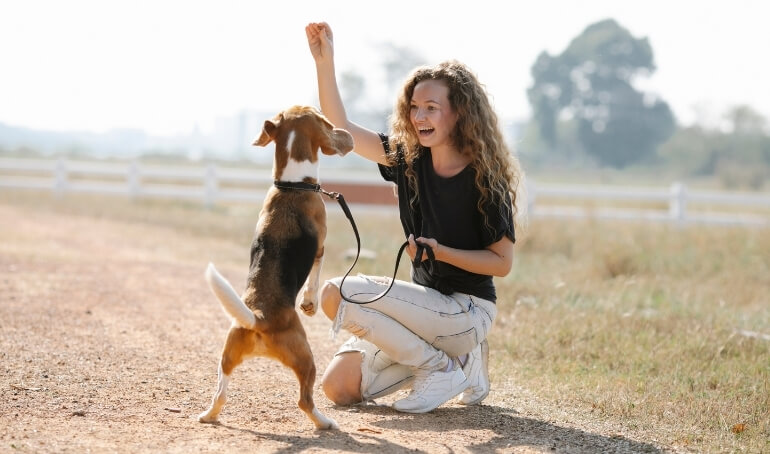
Positive Reinforcement | Rewarding Good Behaviors
Positive reinforcement is the preferred training method at the Virginia Beach SPCA. This training approach helps you set the foundation for good behavior while also establishing a strong, trusting connection between you and your pet. By using positive reinforcement methods, your dog or cat will learn your house and lifestyle rules while also enjoying the fun of extra time with you! Then, once you’ve mastered the basics, you can use this same approach to teach your pet tricks.
The approach to positive reinforcement is simple – you reward your pet immediately following a wanted behavior. Let’s say you have been working with your dog to teach them to sit. As soon as your pup sits, give them a reward such as a treat. With practice and consistency, your dog or cat will begin to associate positive things with the wanted behavior, making them more likely to repeat the behavior.
Choose a Reward
Different pets respond to different rewards. Rewards include treats, toys, praise, or affection such as petting. You can use one type of reward every time, or you can mix it up. The most important part is that your pet enjoys and responds to the reward you have chosen.
If you are using treats as a reward, be sure to use small, soft pieces of food that your cat or dog can eat quickly. This will keep your pet engaged and focused on you and the treat. Treat rewards should also be accompanied with verbal praise, such as “good boy” in a happy tone of voice.
Timing is Everything
It is critical to reward your pet as soon as the desired behavior occurs. For example, if you are working on the command “sit,” reward your pet as soon as he sits to reinforce the wanted action. If you wait until your pet is starting to stand up again, the reward will be associated with standing up instead of sitting.
Consistency is Key
Consistency in your training will help your pet learn faster and reinforce wanted behaviors. It is very important that everyone in the family uses the same verbal cues and timing, otherwise your dog or cat could become confused by what you want from them. For verbal cues, be sure to use short words such as “sit” or “down”. Use a calm voice and do not repeat the word.
Once your pet is reliably repeating the behavior you want, you can gradually reduce how often they are given physical rewards like treats or toys, but be sure to continue verbal praise. Don’t reduce the frequency of rewards too quickly – otherwise, your pet could become confused or frustrated. Your pet needs to understand that he will eventually be rewarded for correct behaviors.
Sometimes pets do not learn as quickly as we would like. It is important to keep your frustration in check. Take a break from training, and if you feel like you are not making the proper amount of progress, consider getting help from one of our recommended professional trainers.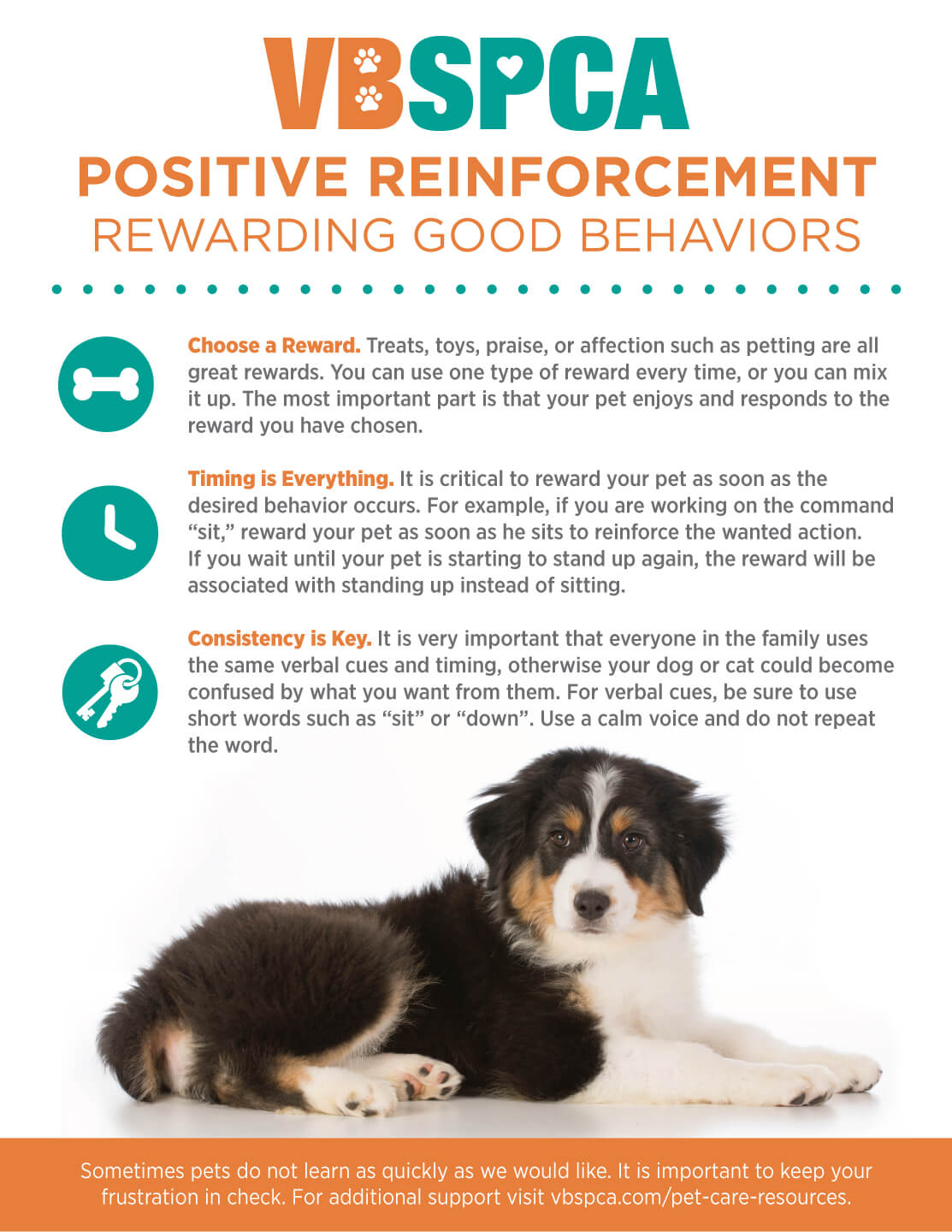

Happy Tails | Cheddar
Every single animal that comes through our shelter has a story. Some are complex, many are sad, but all of them get better the minute they arrive at the Virginia Beach SPCA. Cheddar came to the VBSPCA in February 2020 when his previous owner moved into a home where pets weren’t allowed. Around that same time, Lisa and her family were finally ready for a new furry friend after losing their three cats to different sicknesses over the past few years. The VBSPCA staff introduced Cheddar to Lisa and her family, and the rest is history! We recently caught up with Lisa to hear about life with Cheddar… and another VBSPCA animal.
How did you find Cheddar?
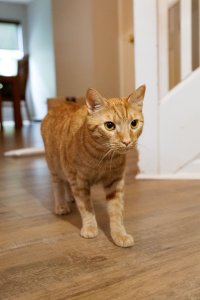 In late February 2020, my kids started to ask when we would be getting another cat. They wanted a kitten, as they had never been around a kitten before. One Saturday, we randomly stopped at the VBSPCA to see kittens and cats. I told two different employees that I was looking for a social cat or kitten, and they each led me to Cheddar. We immediately fell in love with him! We loved his outgoing personality and his talkative nature. We did find out that he had been sick at the SPCA with urinary issues. Initially, I was hesitant to adopt him because we had just dealt with our other cat’s sickness the year before and it was so upsetting and exhausting on so many levels. However, we loved Cheddar so much and felt a connection to him so we decided to take a chance and adopt him. I’m so happy we did!
In late February 2020, my kids started to ask when we would be getting another cat. They wanted a kitten, as they had never been around a kitten before. One Saturday, we randomly stopped at the VBSPCA to see kittens and cats. I told two different employees that I was looking for a social cat or kitten, and they each led me to Cheddar. We immediately fell in love with him! We loved his outgoing personality and his talkative nature. We did find out that he had been sick at the SPCA with urinary issues. Initially, I was hesitant to adopt him because we had just dealt with our other cat’s sickness the year before and it was so upsetting and exhausting on so many levels. However, we loved Cheddar so much and felt a connection to him so we decided to take a chance and adopt him. I’m so happy we did!
How is Cheddar doing in the home?
We adopted Cheddar on March 4, 2020. It was immediately before the COVID-19 lockdown, so it was such a great time to adopt him as we were all home and were able to help him adjust more easily to our home. Since adopting Cheddar, he has had absolutely no urinary issues! He is very healthy and has thrived in our home. It took him a little while to adjust, which is to be expected. However, he is very comfortable in our home now, and he has become such an important addition to our family.
What sort of activities do you and Cheddar do together?
Cheddar loves wand toys and chasing fuzzy mice toys. He naps in my office while I am working. He is always in our presence.
How has Cheddar enriched your life?
Pets bring so much joy! Cheddar didn’t replace the cats we lost, but he has helped us to heal. He is such a sweet and docile cat and we are all so happy that we adopted him. It was meant to be! Cats are such fun and interesting pets to have and like any pet, they provide unconditional love.
You also adopted a kitten in June 2021. Why did you decide to adopt another feline?
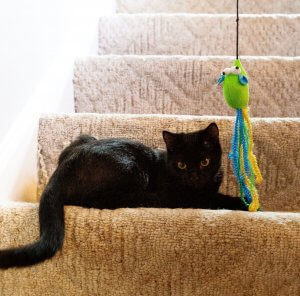 My kids still wanted a kitten. I wanted to wait a while to allow Cheddar to become fully comfortable in our house. He is still a young cat, so I thought maybe a buddy would be good for him. We visited the VBSPCA again in early June 2021 and met Frisco, an 8-10 week old kitten. He was full of spunk and energy and as with Cheddar, we all felt a big connection to him. It took a while to introduce Cheddar and Frisco, but they seem to really love each other a lot now. They still “rough house” with one another, but they now play with each other more, nap near each other, and follow each other around the house. It has been great for both of them! Frisco is now about four months old and still full of a LOT of energy! We love when kittens do the “sideways” jump.
My kids still wanted a kitten. I wanted to wait a while to allow Cheddar to become fully comfortable in our house. He is still a young cat, so I thought maybe a buddy would be good for him. We visited the VBSPCA again in early June 2021 and met Frisco, an 8-10 week old kitten. He was full of spunk and energy and as with Cheddar, we all felt a big connection to him. It took a while to introduce Cheddar and Frisco, but they seem to really love each other a lot now. They still “rough house” with one another, but they now play with each other more, nap near each other, and follow each other around the house. It has been great for both of them! Frisco is now about four months old and still full of a LOT of energy! We love when kittens do the “sideways” jump.
Do you have any funny stories to share from your time together?
Cheddar and Frisco chase each other like crazy through our house! Their interactions while they play can be very comical and entertaining as well. We bought a cat tunnel for them recently and they play their version of “hide and seek” in it. It’s really funny!
Why do you think people should consider adopting a pet from a shelter?
All of our cats have been rescues! I love going that route because it’s such a blessing and it’s a wonderful opportunity to give a sweet animal a second chance and to provide them with a loving home.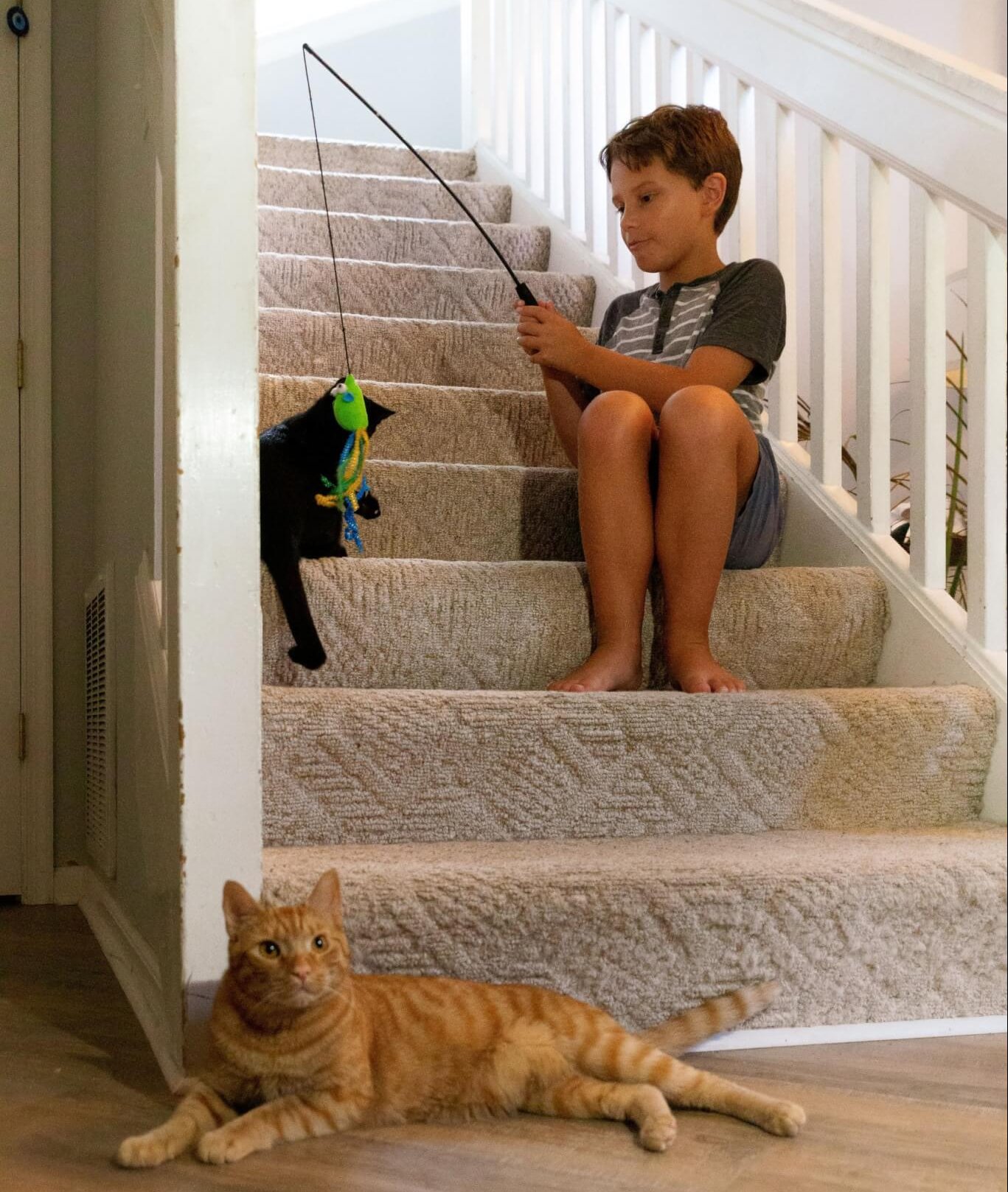
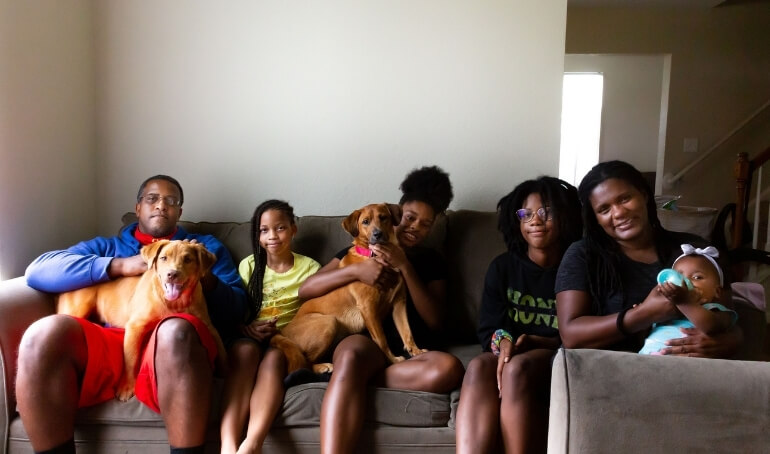
Happy Tails | Lianides
Every single animal that comes through our shelter has a story. Some are complex, many are sad, but all of them get better the minute they arrive at the Virginia Beach SPCA. Lianides came to the VBSPCA as a young puppy in March 2021. His previous owners were unable to take care of his litter, so the Labrador Retriever mix and his four siblings were placed into one of our foster homes until they were old enough for the adoption process. Once Lianides was available for adoption, he quickly caught the eye of Shonda and her family. They officially adopted Lianides on May 3, 2021. We recently caught up with Shonda to see how Lianides is doing in his forever home.
How did you know Lianides was the one for you?
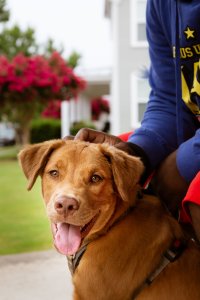 We found Lianides on the VBSPCA website under the puppy section. We knew he was the one when we saw his playful energy and beautiful green eyes!
We found Lianides on the VBSPCA website under the puppy section. We knew he was the one when we saw his playful energy and beautiful green eyes!
How is Lianides doing in the home?
Lianides is doing great in his new home with us and his dog brother, Chase, who we adopted in November 2020 from the Norfolk SPCA. Lianides roams the house as if he was born there.
What sort of activities do you and Lianides do together?
We attend the dog park so he can run around and play freely. We play tug-o-war with his rope toy, ball, and catch.
Do you have any funny stories to share from your time together?
When he was neutered and he had the cone around his neck, it was funny to see him climb the stairs in the house. He would get knocked back but he would not quit: he was determined to make it up with everyone else. He got lots of cuddles at that time.
How has Lianides enriched your life so far?
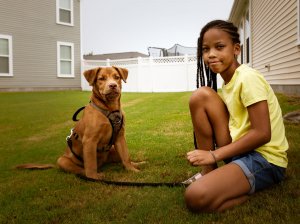 Lianides has been amazing in our family. He has enriched our lives by being there to cuddle, to hug, to play with, to bring smiles to our children’s faces – the little ones especially because he is very young just like them. Now Chase has a dog puppy pal to run around with and match each other’s energy.
Lianides has been amazing in our family. He has enriched our lives by being there to cuddle, to hug, to play with, to bring smiles to our children’s faces – the little ones especially because he is very young just like them. Now Chase has a dog puppy pal to run around with and match each other’s energy.
Why do you think people should consider adopting a pet from a shelter?
If anything, to simply experience feeling love at first sight And making a shelter animal feel loved and special is heartwarming in itself.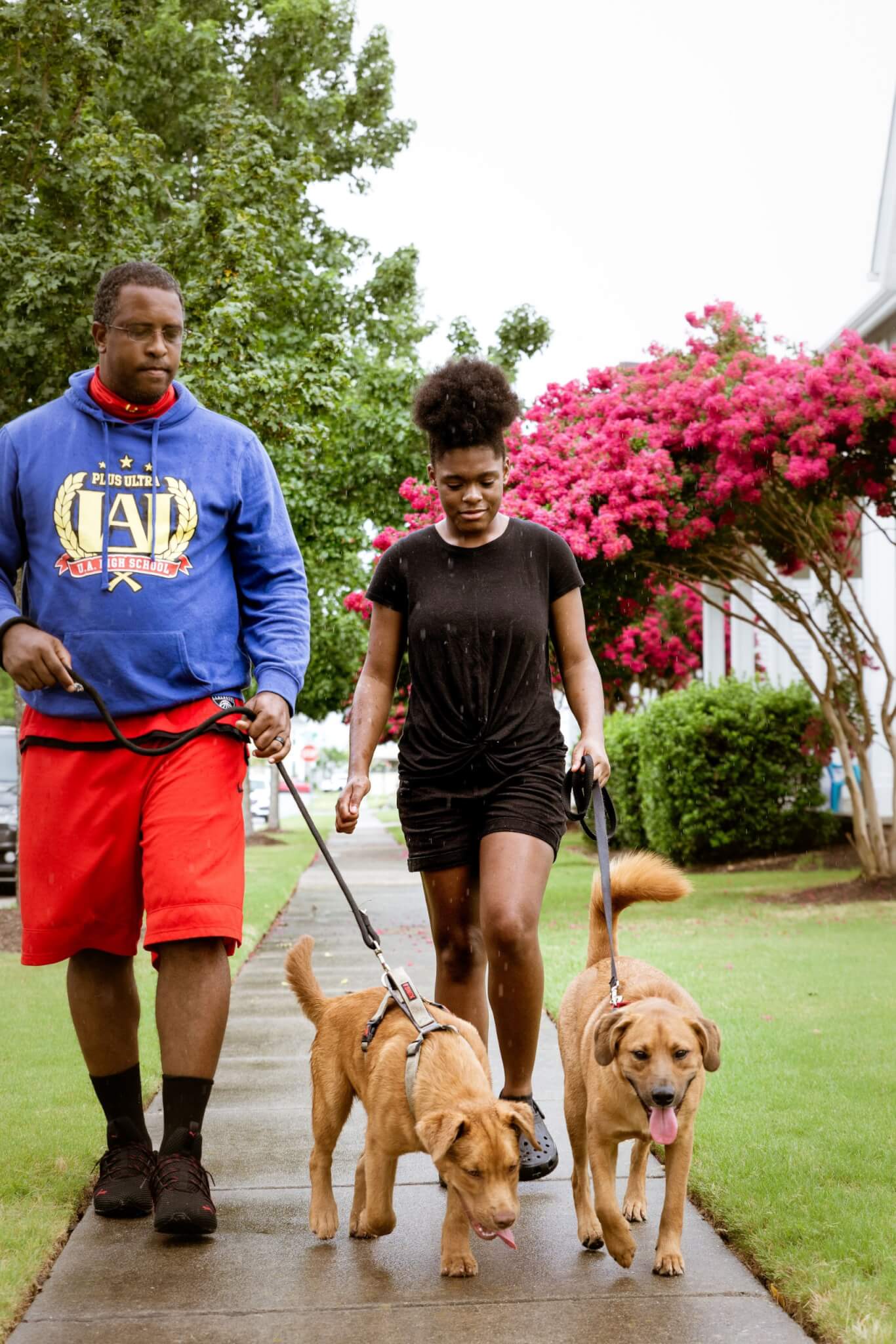

Litter Box Issues | Causes and Solutions
While cats can be incredible companions, sometimes our feline friends to develop litter box issues. According to the ASPCA, 10% of all cats will experience elimination issues at one point or another, and staying on top of their health and mental wellness can help prevent these issues from occurring. However, even the most responsible pet parents can find themselves confronting this unpleasant issue.
The most common reasons your cat may be experiencing litter box challenges are illness, stress, or anxiety. Your veterinarian will be able to determine if there are any medical problems, such as a urinary tract infection, and provide treatment if it is needed. If your veterinarian finds that your cat does not have any medical concerns, you will need to think through your cat’s behaviors and environment to figure out what is causing your cat to make litter box mistakes.
Anxiety
Felines who are anxious or stressed may start to make litter box mistakes. Changes in the environment can lead to anxiety or stress, such as a new person in the home (like a newborn baby, roommate, or spouse), adding another pet to the family, or moving.
If your cat is reacting to a new person, help them make friends by feeding, grooming, and playing with the cat when the new resident is around. If you believe the litter box issues are related to a recent move, consider setting your cat up in a small space with everything they need and gradually allowing them access to more of the home.
Litter Box Aversion
When cats have an unpleasant litter box experience, they may choose to do their business somewhere else. Litter box aversions can quickly form when a box is not kept clean, if the cat is startled while in the box, or if a medical issue is causing the cat to experience pain while using the box.
Start by making sure your cat’s litter box is clean. Scoop it at least once a day, add in fresh litter often, and change the litter completely at least once or twice a month. You should also make sure the litter box is in a quiet place that is convenient for your cat to access. If your box has a lid, there is a chance your cat feels trapped, so try removing the lid entirely. If the problem persists, consider adding a new box in a different location and using another litter so that your cat does not associate the negative experience with the new box.
Soiled Areas
Animals are very likely to go to the bathroom in a place where they can smell urine or feces. Be sure to thoroughly clean soiled areas so your cat is less likely to be drawn back to that specific place.
Preference Related Problems
Cats may have texture or location preferences, and these preferences may be established early on or can develop later in life. If your cat avoids the litter box and habitually goes to the bathroom on soft surfaces, switch to a high quality, scoopable litter and put a soft rug under the litter box. For felines who prefer slick, smooth surfaces, try putting a thin layer of litter on one side of the box and leave the other side empty, then place the box on a hard surface. If your cat has a history of being outside, try adding some soil to the litter box.
If you have noticed that your cat avoids the litter box and always goes to the bathroom in the same place, try putting the litter box in that place and gradually moving it to a more convenient location. Another alternative is to deter your cat from using the bathroom in that location by placing an upside down carpet runner, aluminum foil, or citrus-scented cotton balls in that area.
Territorial Marking
Cats who feel threatened may mark their territory. Causes of territorial marking include conflicts between pets in the home or the presence of unfamiliar people or animals. Territory related issues can be complicated and require behavior modification, and it is best to start by consulting with your veterinarian.
While litter box issues can be frustrating, it is important not to punish your cat. Doing so will only make your feline friend afraid of using the bathroom while you are around. With a little detective work and patience, you will be able to find a solution to your cat’s litter box issues.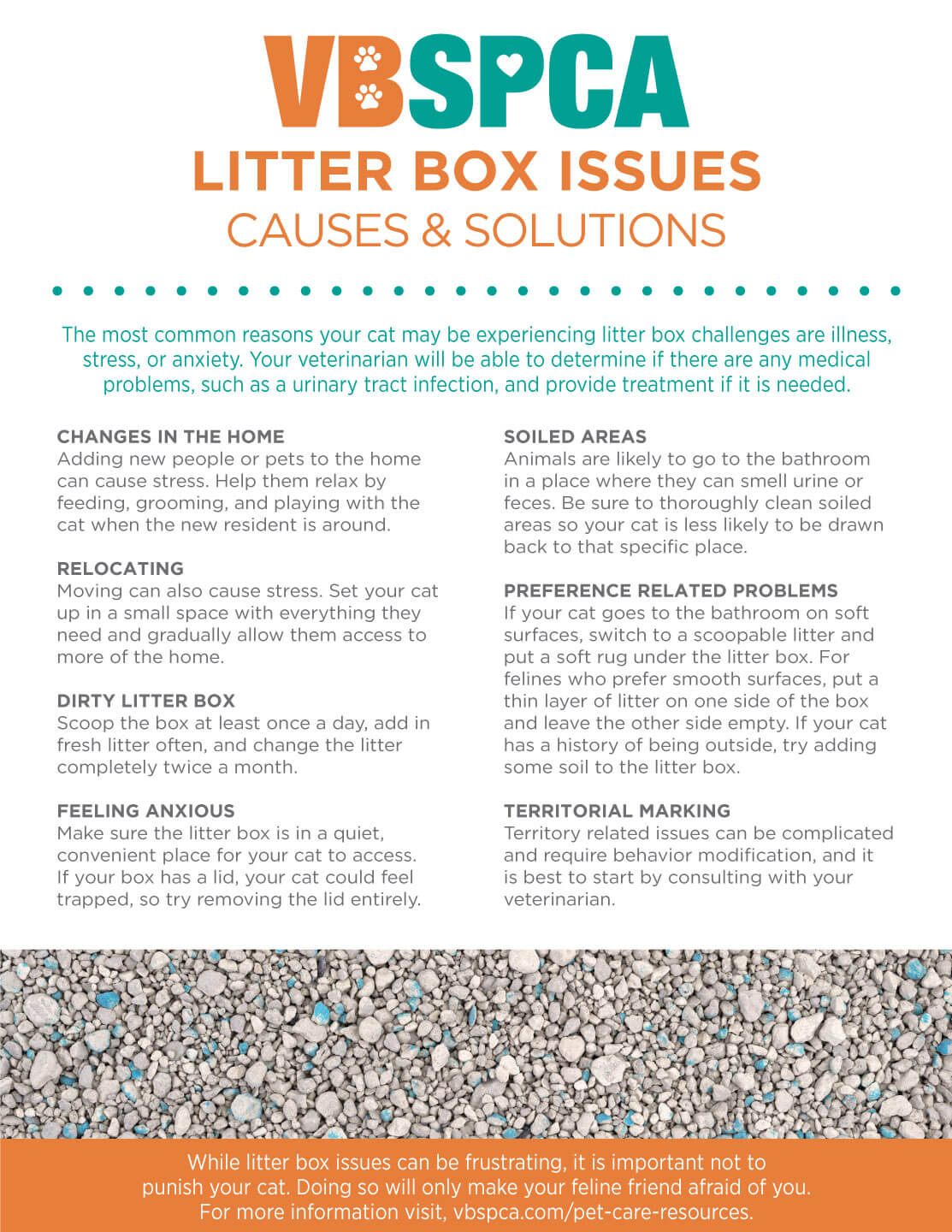
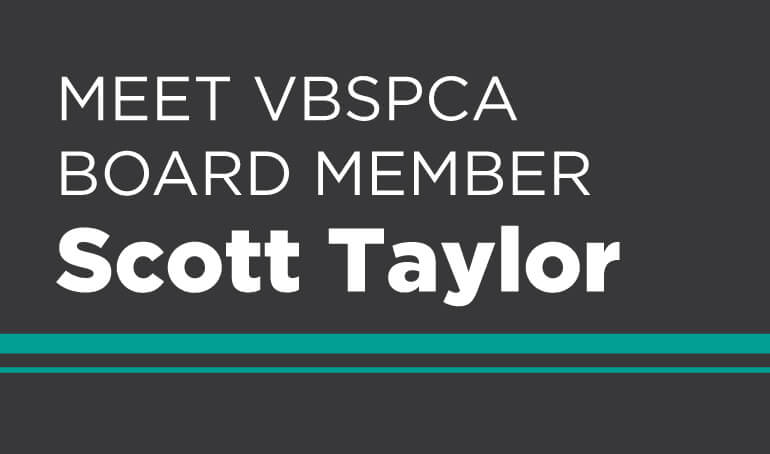
Scott Taylor | In Service to the VBSPCA for 8 Years
Since 2013, Scott Taylor has been a very familiar face at the Virginia Beach SPCA. It all started with a tour of the VBSPCA Shelter. “The impact that was evident during that first visit spoke to me, and I knew I had to do more than volunteer or donate,” Taylor recalled. He joined the VBSPCA Board of Directors that year and later stepped up as Board Chair in 2017. 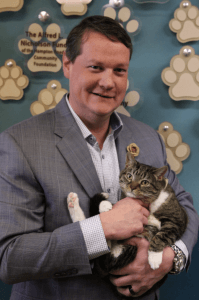 With his experience as a business owner, Taylor has successfully guided the VBSPCA through unique periods of change thanks to his expertise and leadership skills. He has also donated the time and services of his businesses, Taylor Construction and Va Valet, as well as sponsored numerous VBSPCA events. For Taylor, giving back to his community is a must. “To me, being philanthropic is not a choice – it’s a requirement,” said Taylor. His support of the VBSPCA stems from the compassion for animals demonstrated by his father. Taylor currently has two cats, Olivia and Penny, who were both adopted from our shelter.
With his experience as a business owner, Taylor has successfully guided the VBSPCA through unique periods of change thanks to his expertise and leadership skills. He has also donated the time and services of his businesses, Taylor Construction and Va Valet, as well as sponsored numerous VBSPCA events. For Taylor, giving back to his community is a must. “To me, being philanthropic is not a choice – it’s a requirement,” said Taylor. His support of the VBSPCA stems from the compassion for animals demonstrated by his father. Taylor currently has two cats, Olivia and Penny, who were both adopted from our shelter.
As Board Chair, Taylor’s top priority has been to ensure the VBSPCA has strong leadership and financial standing in order to sustain the organization well into the future. He is inspired by the teamwork that is evident in our shelter and clinic as well as how many animals receive their second chance at our facility. “The animal welfare impact is a shockwave that continues to impact more and more people and animals as the organization grows.”
Taylor shared that he would like to challenge members of the community to think about how they could be involved with helping animals. “Maybe it’s volunteering once a month at the shelter, or going through their old linens and seeing what they can donate, or possibly [setting] up a monthly recurring donation,” said Taylor. “Anything [they] can do to help will allow us to make more of an impact on the animal community we are here to serve.”
Taylor’s time as Board Chair will come to a close in September as we enter a new fiscal year, but he will remain on the Board of Directors. We are grateful for his years of support, and his legacy at the VBSPCA will undoubtedly resonate for many years to come.
If you are interested in serving on the Virginia Beach SPCA Board of Directors, please email Emily.Peck@vbspca.com for more information.

Happy Tails | Buttercup
Every single animal that comes through our shelter has a story. Some are complex, many are sad, but all of them get better the minute they arrive at the Virginia Beach SPCA. Buttercup came to the VBSPCA in December 2020. In addition to a second chance, the six year old Calico needed surgery for severe dental disease. Buttercup got the medical care she needed at our clinic and waited for her adoption dreams to come true in our cattery. For a while, she was our longest feline resident. That all changed when a woman named Terri brought her daughter to meet our cats in May. We recently caught up with Terri to hear the rest of Buttercup’s story.
How did you know Buttercup was the one for you?
 My daughter really wanted to get a cat. We have two dogs and our cat (Jonah, 17) had to be put down in December. I had been looking at the VBSPCA website for about a week and always seemed to end up at Buttercup’s picture. It was my daughter who made the final decision. She saw Buttercup and looked at a few other cats, but Buttercup was our girl. We had discussed in the past that we didn’t want to get a kitten, we wanted an older animal since they need good forever homes too. I surprised my daughter after school and just drove to the VBSPCA. As soon as she saw where we were going, she started to cry. She knew we were going to see the cats.
My daughter really wanted to get a cat. We have two dogs and our cat (Jonah, 17) had to be put down in December. I had been looking at the VBSPCA website for about a week and always seemed to end up at Buttercup’s picture. It was my daughter who made the final decision. She saw Buttercup and looked at a few other cats, but Buttercup was our girl. We had discussed in the past that we didn’t want to get a kitten, we wanted an older animal since they need good forever homes too. I surprised my daughter after school and just drove to the VBSPCA. As soon as she saw where we were going, she started to cry. She knew we were going to see the cats.
How is Buttercup doing in the home?
Buttercup is settling in very well. We have been doing a slow interaction with the dogs. She spends most of her time in my daughter’s room, and sleeps with her. It’s her happy spot. I’ve found her sleeping on top of my daughter. She is super sweet and loves belly rubs. She is very vocal as well.
What sort of activities do you and Buttercup do together?
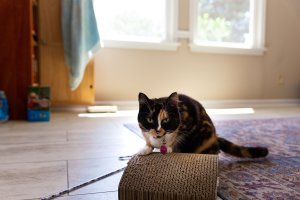 She LOVES the laser pointer. She will chase that light all over the upstairs forever. She also has ball toys and string toys that she loves.
She LOVES the laser pointer. She will chase that light all over the upstairs forever. She also has ball toys and string toys that she loves.
How has Buttercup enriched your life so far?
Buttercup has brought us so much joy. She is just so sweet and we love her so much. I’d like to think she knows we’re her people and she’s here forever.
Why do you think people should consider adopting a pet from a shelter?
I definitely think folks should adopt from shelters. The pets that are there, it’s not from any fault of their own. I know people have different reasons for not being able to keep a pet, but the poor babies all deserve to have a great home where they will be loved, comfortable, and taken care of. I would recommend older animals because people usually want puppies or kittens but the older ones need love too.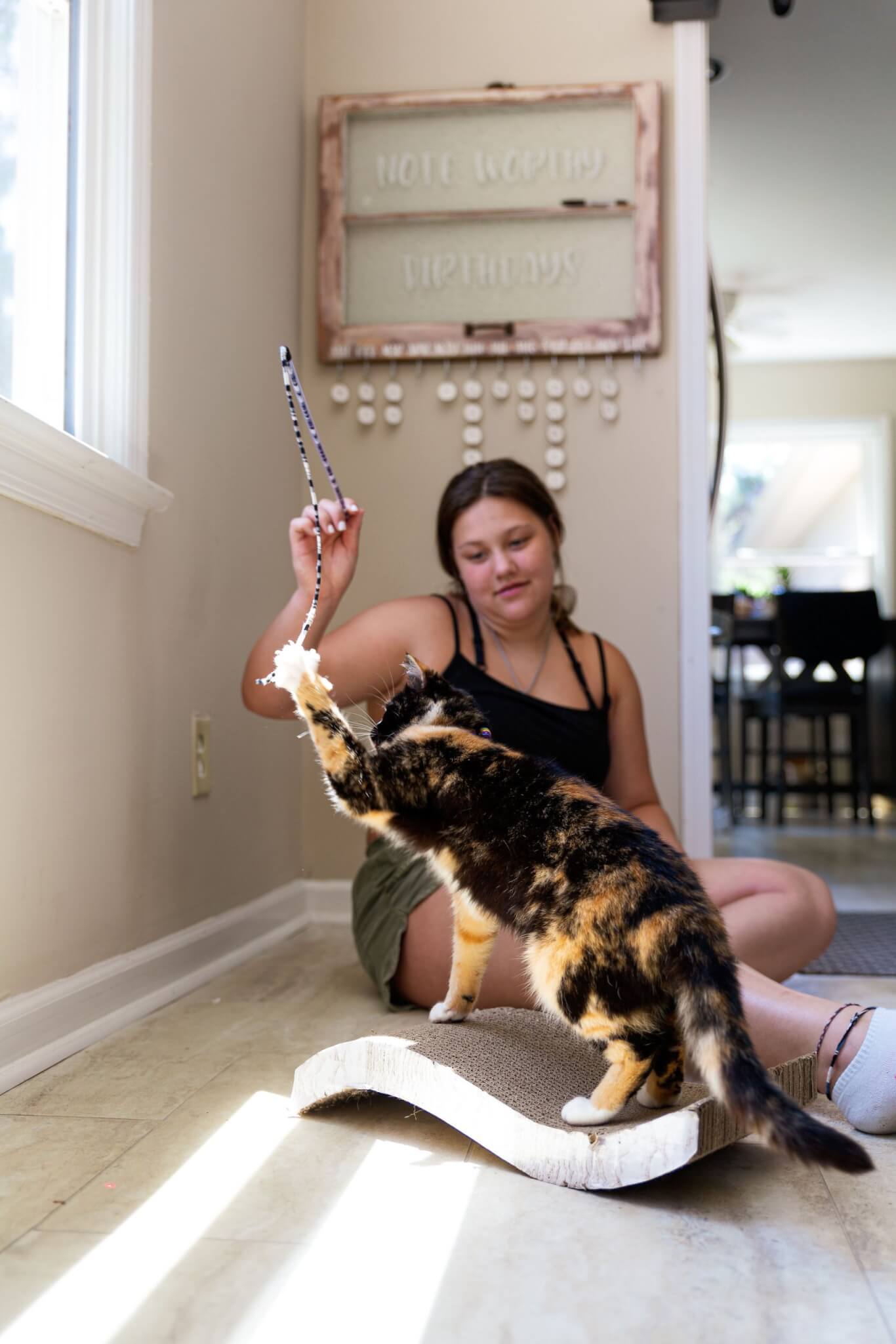
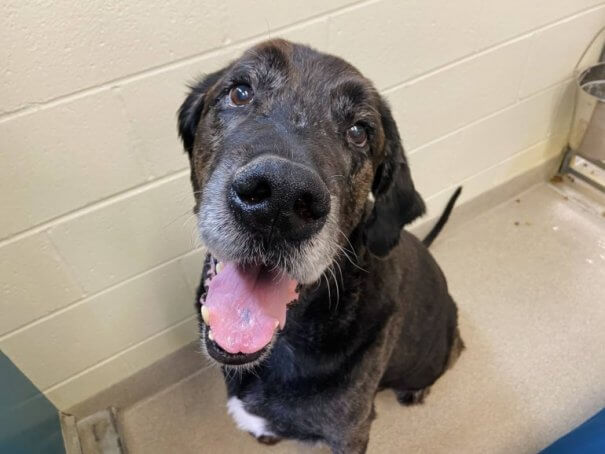
Senior Dogs at Virginia Beach SPCA Fetch Grant
Senior dogs have something to wag about this summer as The Grey Muzzle Organization announces the recipients of its annual grants, and dogs at the Virginia Beach SPCA are among the recipients.
The VBSPCA is one of 77 animal welfare groups chosen from 266 applicants to receive a grant to help local senior dogs. The winning groups received more than $616,000 in grants to help save or improve the lives of at-risk old dogs in their communities. A total of $10,000 was awarded to the VBSPCA.
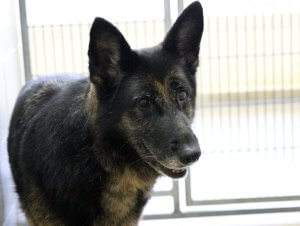
“This grant will help the Virginia Beach SPCA give senior dogs like seven year old Nova the veterinary and dental care she needs so she’ll be ready to go to her forever home,” said Derby Brackett, CEO of the VBSPCA. “No one is more grateful or loving than an older dog, and we’re looking forward to helping more senior dogs get the second chance they all deserve.”
Over the past 13 years, the national nonprofit Grey Muzzle Organization has provided more than $3.1 million in grants to support its vision of “a world where no old dog dies alone and afraid.”
“Thanks to the generosity of our donors, we’re delighted to help deserving organizations like the Virginia Beach SPCA make a difference in the lives of dogs and people in their communities,” Grey Muzzle’s Executive Director Lisa Lunghofer said. “Many senior dogs in Hampton Roads are enjoying their golden years in loving homes thanks to the wonderful work of the VBSPCA.”
To learn more about why you should consider a senior pet, click here.

Dog Water Safety | Protect Your Pet at the Beach, Lake, and Pool
Spending time in the water with your pet can be a fun way for them to enjoy the great outdoors, especially during the hot months of summer. However, knowing the basic rules of water safety is a must for all pet parents, especially considering over 5,000 dogs are estimated to drown in pools each year.
The most important water safety rule is to keep an eye on your pets any time they are near water. This includes pools, oceans, lakes, and rivers. Never allow unsupervised swimming as accidents can happen very quickly.
Most dogs can swim, but not all of them enjoy it and some dog breeds are naturally better swimmers than others. Retrievers and Poodles in particular are known to be excellent swimmers. On the other end of the spectrum, you should be especially careful around water with brachycephalic breeds (breeds with flat faces) such as Bulldogs, Pugs, and Shih-Tzus as well as any mixed breed that has a short snout. These breeds’ flat faces and big chests cause them to tire more quickly while swimming and put them at increased danger of sinking. Be sure to keep a close eye on puppies as well. Puppies are clumsy and energetic, which makes it easy for them to fall into a pool. They also tire very quickly.
In addition to supervising your dog during swim sessions, here are some other safety tips to keep in mind:
Water Conditions
Check the current water conditions if you plan to let your dog swim in the ocean or a river. Rip currents, undertows, or fast moving currents can be extremely dangerous for canines and humans alike. You should also make sure the water temperature is not too cold. A general rule of thumb is that if you are cold in the water, it is probably too cold for your pet.
Take Precautions
Your dog should be able to easily get out of water on their own. Install stairs they can climb, a ramp that is made for pets, or a fence around the pool. Make sure that the fence is tall enough to keep them out and keep the gate secure.
Life Jackets
Dog life jackets not only keep your dog afloat, but can also help you spot them in the water and make it easier for you to pull them out since dog life vests have handles on them. Consider purchasing one for your pet, especially if you are taking them out on a boat.
Bring Drinking Water
Make sure you have fresh drinking water for your dog to drink. Letting them lap up lake, river, pool, or ocean water can make them sick since it can contain bacteria, algae, parasites, chemicals, or salt.
Take Breaks
Swimming can be very tiring for dogs. Stay close to your pet and make sure they take breaks in the shade.
Wash Up
Rinse off your dog or give them a bath after swim sessions. Salt or pool chemicals can irritate your dog’s skin. Additionally, if your dog licks their fur, the salt or pool chemicals could make them sick.
Remember, not all dogs like to swim or are good swimmers. If your canine companion is more of a land lover, try introducing them to baby pools or spraying them with a hose as alternative outdoor water activities.
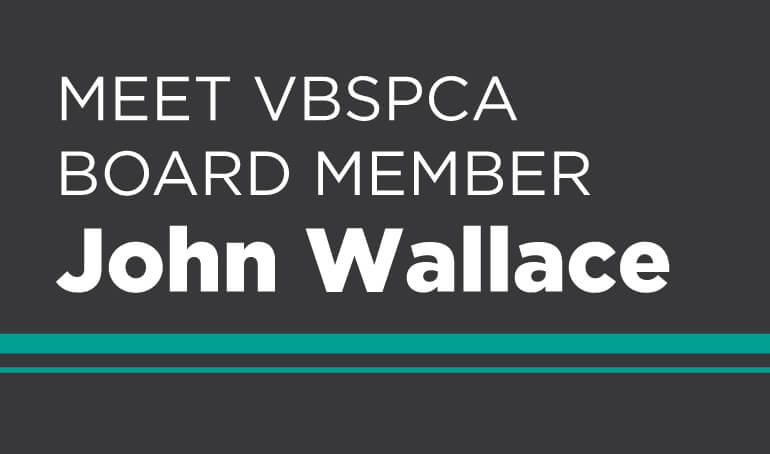
John Wallace | In Service to the VBSPCA for 10+ Years
For more than a decade, John Wallace has served on the Virginia Beach SPCA Board of Directors. However, his ties to the organization date back much further. “I have been familiar with the VBSPCA most of my life and adopted my first pet in the mid-80s. I was very impressed by the number of animals the VBSPCA finds home for each year and felt I could help serve its mission.”

With a background in banking and financial planning, Wallace uses his expertise to provide financial guidance to the VBSPCA. He currently serves as a Financial Advisor and Director of Strategic Planning with Impact Financial Partners. Wallace has lived in Virginia Beach for most of his life and is dedicated to giving back to the community. In addition to his service to the VBSPCA, Wallace serves on the United Way’s Community Investment Committee and on the board of the Financial Planning Association of Hampton Roads.
Wallace is most passionate about connecting pets with as many adopters as possible. “Our staff is extremely passionate and makes an incredible effort to take care of the animals and provide them forever homes,” said Wallace. He also notes that the VBSPCA “makes a significant impact in other ways through its educational programs, veterinary clinic, and Neuter Scooter.”
Wallace believes everyone should learn about animal welfare and encourages people to check out the many resources available including the VBSPCA website. His other piece of advice? “Seek opportunities to get involved by volunteering, fostering a pet, or adopting.”
Dedicated individuals like Wallace ensure the VBSPCA can continue working towards its mission of eliminating animal suffering. We are grateful for everything he does to help our animals!
If you are interested in serving on the Virginia Beach SPCA Board of Directors, please email Emily.Peck@vbspca.com for more information.

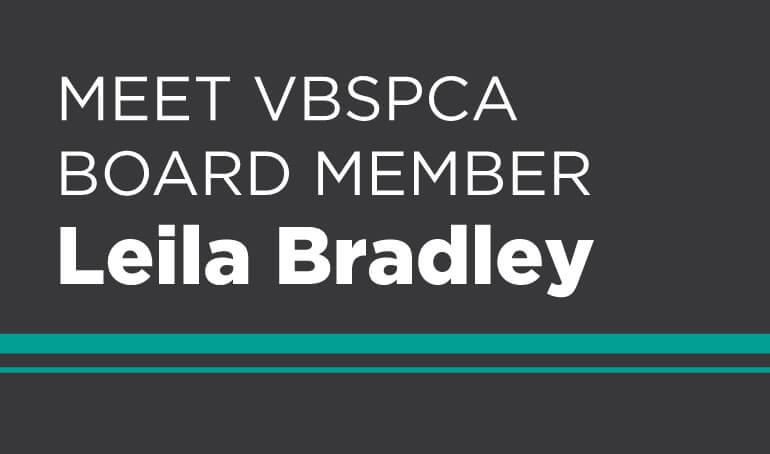
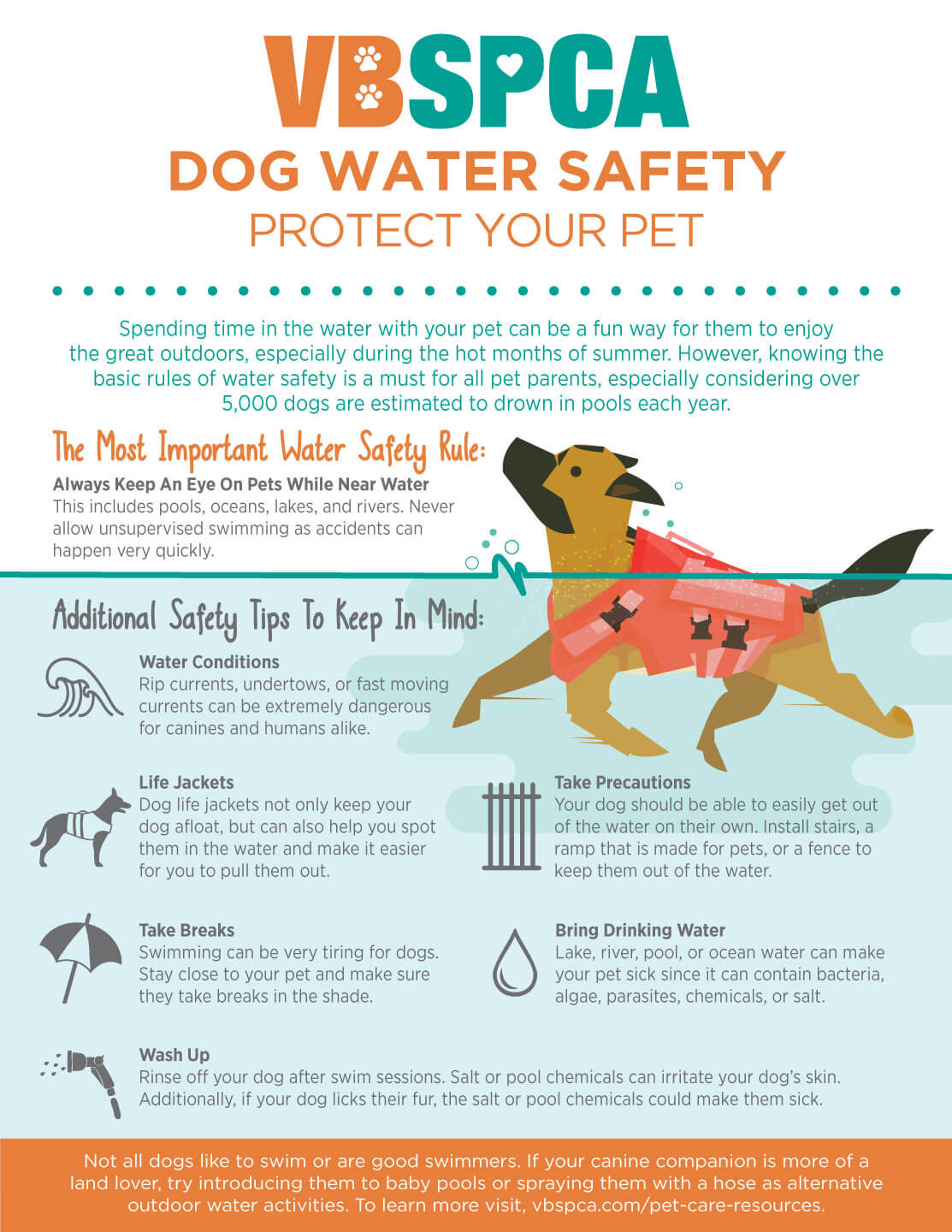



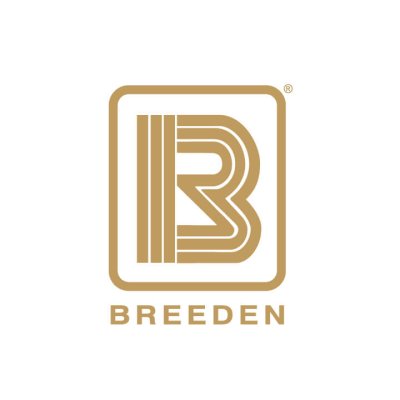

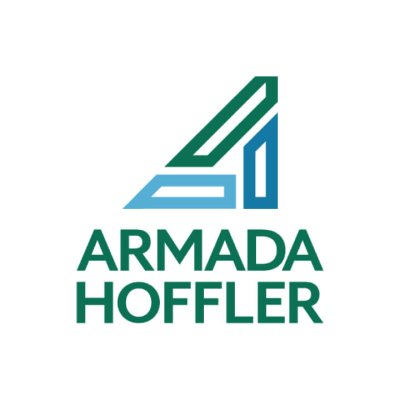











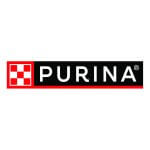

Last Updated: March 8, 2024 by vbspcaadmin
Leila Bradley | In Service to the VBSPCA for 3 Years
Leila Bradley first turned up at the Virginia Beach SPCA as a volunteer in 2017. She adopted her dog Scarlet that same year. A lifelong animal lover, Bradley wanted to become more deeply involved in the organization. When she had the opportunity to join the VBSPCA Board of Directors in 2018, she jumped at the chance.
 Since Bradley joined the VBSPCA Board of Directors, she has aided the organization with her extensive financial expertise. Bradley has worked for TowneBank and Towne 1031 Exchange for nearly two decades, and is currently the Vice President of Towne 1031 Exchange. In addition to her service at the VBSPCA, Bradley is a member of the CHKD Infinity Circle and a volunteer for the United Way and the TowneBank Foundation.
Since Bradley joined the VBSPCA Board of Directors, she has aided the organization with her extensive financial expertise. Bradley has worked for TowneBank and Towne 1031 Exchange for nearly two decades, and is currently the Vice President of Towne 1031 Exchange. In addition to her service at the VBSPCA, Bradley is a member of the CHKD Infinity Circle and a volunteer for the United Way and the TowneBank Foundation.
Fast forward to now, as Bradley begins her time as Board Chair. “Eliminating animal suffering is what I am most passionate about,” said Bradley. “I believe the best way to achieve this is by increasing compassion for animals and educating the community.”
As an active member of the community, Bradley encourages others to get involved with the VBSPCA. When asked how someone should get started, she answered, “By attending the VBSPCA events and visiting the shelter to see firsthand what an impact [the VBSPCA has] on the community and the animals they care for.”
Bradley aims to help the VBSPCA continue to grow as she steps up as the Board Chair and looks forward to working closely with the executive team. We are so grateful for her years of service, and we are excited for what’s to come!
If you are interested in serving on the Virginia Beach SPCA Board of Directors, please email derby.brackett@vbspca.com for more information.